Olympic Games
![]()
This article is about the Olympic Games of modern times. For the ancient competitions of Olympia, see Ancient Olympic Games.
Olympic Games (from Ancient Greek τὰ Ὀλύμπια ta Olýmpia "the Olympic Games" Modern Greek ολυμπιακοί αγώνες olymbiakí agónes "Olympic competitions") is the collective name for regularly held sporting events, the "Olympic Games" and "Olympic Winter Games". At these events, athletes and teams compete in various sports. They are organised by the International Olympic Committee (IOC). The period between the games is called the "Olympics" (from ολυμπιάδα).
The introduction of the Olympic Games of modern times was decided in 1894 as a re-foundation of the ancient festival in Olympia at the suggestion of Pierre de Coubertin. As a "meeting of the youth of the world" they were supposed to serve the sportive comparison and the international understanding, they replaced the Olympics which had been held since 1856. Since 1896 Olympic Games take place every four years and since 1924 Olympic Winter Games. Since 1994, the Winter and Summer Games have alternated every two years. The 32nd Summer Olympics in Tokyo are an exception. These should have taken place in 2020, but were postponed to 2021 due to the COVID 19 pandemic.
The IOC also sponsors the Paralympics as competitions for disabled athletes, the Deaflympics, Special Olympics and the World Games for non-Olympic sports. In addition, since 2010 there have been the Youth Olympic Games, which are intended for young people aged 14 to 18.
The Olympic Games have grown steadily in scope, so that almost every country in the world is now represented by athletes. Next to the football world championships, they are currently considered the biggest sporting event in the world.

Olympic flag with the five rings; first used at the Olympic Games in Antwerp 1920
Ancient Olympic Games
→ Main article: Olympic Games of antiquity
The origin of the Olympic Games of antiquity is believed to be in the 2nd millennium B.C. The lists of winners date back to 776 B.C. and were reconstructed in the 4th century B.C.. Counting by Olympiads was a measure of time throughout ancient Greece. "Olympiad" is thus - contrary to a common misconception today - not synonymous with "Olympic Games", but refers to the four-year period beginning with the Games. The Olympic Games, named after their venue Olympia in the northwest of the Peloponnese peninsula, were part of a cycle that included three other Panhellenic Games: the Pythian Games at Delphi, the Nemean Games at Nemea, and the Isthmian Games on the Isthmus of Corinth.
In the early days there was only one race over the distance of the stadium (192.24 meters). With the time the games got more and more importance. However, they were not a "sporting event" in our modern sense, but a religious festival in honor of Zeus, the father of the gods, and the divine hero Pelops. In their heyday, the games lasted five days - the first day was dominated by ritual ceremonies such as consecration and the entry of the athletes, coaches, referees and spectators into the sacred grove of Olympia. Apart from the competitions - at last there were 18 in the sports athletics, heavy athletics, pentathlon and horse riding - musical competitions were just as important. Not the sport as such was the focus, but the religious component.
The actual games began with the procession of all participants to the temple of Zeus. Here the athletes swore to abide by the rules of the games. The winners received a victory wreath made of olive branches and a headband. They were considered "favored by the gods" and immortalized with poems and statues. Every defeat, even a second or third place, was considered an irredeemable disgrace. The losers returned home by stealth to escape the ridicule that awaited them. The most famous Olympian of antiquity is the wrestler Milon of Kroton, the first known by name is Koroibos.
From today's point of view, the ancient games were extraordinarily brutal, every participant in the classical martial arts (boxing, wrestling, stick fencing, pankration) also had to reckon with death, and in some cases fighters were declared victors for their perseverance after their death in battle had been determined.
When the Romans conquered Greece in 148 BC, the Olympic Games lost their panhellenic character. From now on, non-Greek athletes were also allowed to participate.
In 393, all pagan ceremonies, including the Olympic Games, were banned by the Roman Emperor Theodosius I. However, the cult in Olympia was probably maintained until the beginning of the 5th century AD. It was not until Theodosius II that the Olympic Games were finally banned in 426. However, there are indications that afterwards the competitions continued secretly and at a lower level until natural disasters destroyed the place of worship in the 6th century.
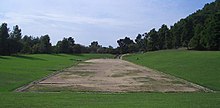
Olympic stadium
The Olympic Games of the Modern Era
→ Main article: Summer Olympics and Winter Olympics
→ Main article: Paralympic Games and Youth Olympic Games
Forerunner
The Olympic idea was not completely lost. Thus, the Cotswold Olympick Games were held for the first time in the west of England at the beginning of the 17th century. Another attempt to revive the Olympic Games was the Olympiades de la République, which were held annually from 1796 to 1798 in revolutionary France. The use of the metric system in sports also dates back to this event. In 1850 the agricultural reading society of Much Wenlock in the English county of Shropshire introduced an "Olympic class". This evolved into the Wenlock Olympian Games ten years later, which continues today as the Wenlock Olympian Society Annual Games. In 1866, William Penny Brookes, chairman of the Wenlock Olympian Society, organized national Olympic Games at London's Crystal Palace.
The Greek interest in the reintroduction of the Olympic Games awoke after the Greek Revolution against the rule of the Ottoman Empire. The poet and publisher Panagiotis Soutsos made the first corresponding proposal in his poem "Dialogue of the Dead" published in 1833. The most important forerunner of the modern Olympic Games is considered to be the Olympics, which in turn were modelled on the Munich Oktoberfest. They were initiated by the wealthy Greek merchant Evangelos Zappas, and by a royal decree of Otto I were considered a national task of high rank, which also received international attention. The first edition took place in 1859 in the centre of Athens. Zappas had the Panathinaiko Stadium repaired, which was the venue of further Olympiads until 1889.
Revival of the games
After the sport and temple complexes of Olympia were rediscovered in 1766, large-scale archaeological excavations began in 1875 under the direction of the German archaeologist and ancient historian Ernst Curtius. Around this time, the romantic-idealistic reception of antiquity became more and more fashionable in Europe; the desire for a revival of the Olympic idea spread. Thus Baron Pierre de Coubertin said at that time: "Germany had dug up what was still left of the old Olympia. Why should not France restore the old glory?" In de Coubertin's opinion, the lack of physical training of the soldiers had been one of the main causes of France's defeat in the Franco-Prussian War of 1870/71. He strove to improve this state of affairs by making physical education compulsory in schools. At the same time, he wanted to overcome national egoisms and contribute to peace and international understanding. The "youth of the world" should compete in sporting contests and not fight each other on the battlefields. The revival of the Olympic Games seemed in his eyes to be the best solution to achieve these goals.
The Wenlock Olympian Games, which de Coubertin visited in 1890, strengthened him in the view that a reintroduction of the Olympic Games on a large scale was possible. He took up Brooke's and Zappa's ideas and added himself the principle of rotation between different host countries. De Coubertin presented his ideas to an international audience at a congress held at the Sorbonne University in Paris from 16 to 23 June 1894, which went down in history as the first Olympic Congress. On the last day of the congress, the participants decided that the first Olympic Games of modern times should be held in Athens in 1896, i.e. in the country of origin. In order to organize the games, the International Olympic Committee (IOC) was founded. The first president became the Greek Dimitrios Vikelas, while de Coubertin first acted as secretary general.
The first games of the modern era proved to be a great success. Although only about 250 athletes participated, they were a great sporting event. The Greek officials were so enthusiastic about the success that they made the proposal to have the games always take place in Greece in the future. But the IOC stuck to the principle of rotation between different countries.
After the initial success, the Olympic movement fell into a crisis. The games of 1900 in Paris and 1904 in St. Louis were embedded in the parallel world exhibitions. The competitions dragged on for several months, were badly organized and hardly noticed, moreover only few foreigners participated in St. Louis. At the Olympic Intermediate Games 1906 in Athens the sporting competitions were again in the foreground. The IOC reluctantly agreed to host them, but never officially recognized the results. Some sports historians regard these games as the salvation of the Olympic idea as they prevented the decline into insignificance.
Further development
The winter sport of figure skating was on the programme of Summer Games in 1908 and 1920, ice hockey in 1920. The IOC wanted to extend this list to cover other winter activities. At the 1921 Olympic Congress in Lausanne, it was decided that the organizers of the 1924 Summer Games should also hold an "international winter sports week" under the auspices of the IOC. This "week" (actually it was eleven days) in Chamonix proved to be a great success, which is why the IOC decided in 1925 to retroactively recognize it as the I Olympic Winter Games and to host further events of this kind in the future in the same year as the Summer Games.
In 1986, the IOC decided to open a separate cycle, starting in 1994, and to hold the Winter Games "in the second calendar year following that in which the Games of the Olympiad are held".
Ludwig Guttmann strove to promote the rehabilitation of physically disabled soldiers of the Second World War and thus integrate them into society. In 1948, he organized a competition between different hospitals, involving several sports. These Stoke Mandeville Games developed into an annual sporting event. Guttmann and others increased their publicity until finally in 1960 the first Paralympics were held. Since then they have been held every four years (since 1976 also in winter). Since 1988, the venues of the Paralympics and the Olympic Games have been identical. Also recognized by the IOC are the Special Olympics for people with mental disabilities, which have been held since 1968, the Deaflympics for the deaf, which were introduced in 1924, and the World Games for non-Olympic sports, which have been held since 1981 and have a high global profile.
The Youth Olympic Games for young athletes between the ages of 14 and 18 go back to an idea of IOC President Jacques Rogge. In 2007 the decision was made to introduce them, in 2010 the Summer Youth Olympic Games were held for the first time in Singapore, and the Winter Youth Olympic Games were held for the first time in Innsbruck in 2012.
From 1912 to 1948, additional Olympic artistic competitions were held. In 1924, 1932 and 1936, the Prix olympique d'alpinisme was also awarded for outstanding achievements in mountaineering.
Growth
In 1896, the first Olympic Games of the modern era had about 250 athletes from 14 countries. Over the years, the number of participants increased steadily. For example, at the 2008 Summer Games in Beijing, over 11,000 athletes from 204 countries took part in 302 competitions. The number of participants at Winter Games is significantly lower in comparison; at the 2006 Winter Games in Turin, just over 2,500 athletes from 80 countries were entered to compete in 84 events.
The number of member countries of the IOC is 205 (see list in the article National Olympic Committee). It is higher than that of the countries recognised by the United Nations (currently 193). This means that there are 13 more IOC members. The reason for this is that nations that do not meet the strict requirements for political sovereignty, as required by most other international organizations, are also admitted. As a result, several colonies or dependent territories have their own delegations that participate separately from their mother countries.
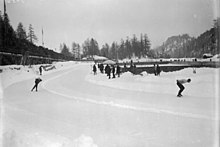
Speed skating 1928 in St. Moritz
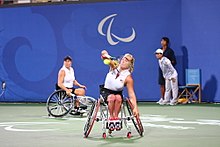
Wheelchair tennis doubles at the 2008 Paralympics in Beijing
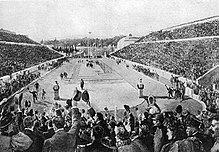
Marathon run 1896 in Athens
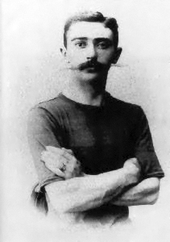
Pierre de Coubertin
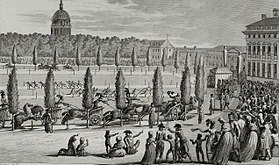
Olympiades de la République in Paris 22 September 1796 (Musée de la Révolution française).
Questions and Answers
Q: What is the Olympic Games?
A: The Olympic Games is an important international event featuring summer and winter sports. It originally began in Ancient Greece at Olympia, and was revived as the "modern" Olympics in 1896 in Athens, Greece.
Q: When are the Summer and Winter Olympic Games held?
A: The Summer and Winter Olympic Games are held every four years.
Q: Were women allowed to participate in the ancient Olympics?
A: No, women were not allowed to participate in the ancient Olympics. However, now there are women's events included.
Q: What other types of games have been created related to the Olympics?
A: The Paralympic Games were created for athletes with physical disabilities, and the Youth Olympic Games were created for teenage athletes.
Q: Why have some Olympics been cancelled throughout history?
A: World War I and World War II led to the cancellation of some Olympic games such as those scheduled for 1916, 1940, and 1944.
Q: Who is responsible for choosing which city will host each Olympic Game? A: The International Olympic Committee (IOC) is responsible for choosing which city will host each game. They are also responsible for deciding which sports will be featured at each game.
Q: Who is credited with creating modern-day Olympics? A: Baron Pierre de Coubertin is credited with creating modern-day Olympics.
Search within the encyclopedia